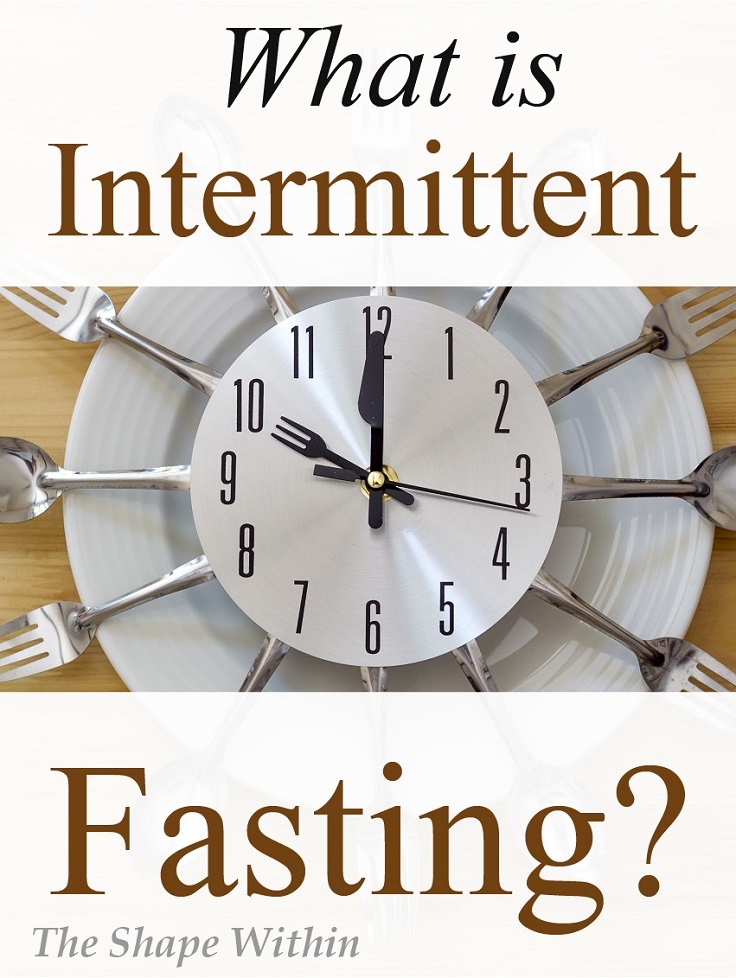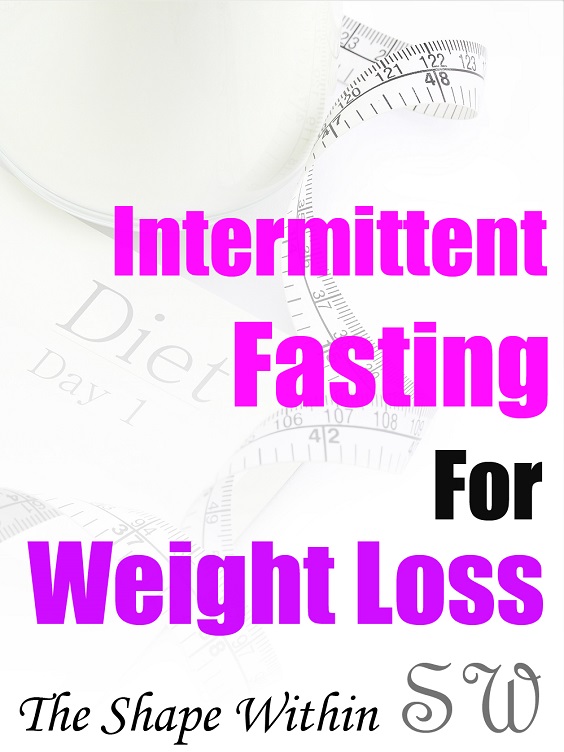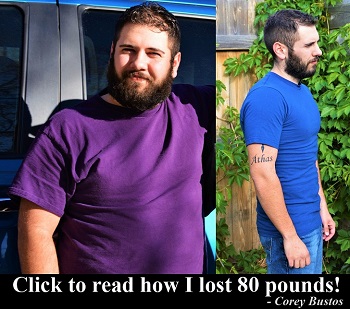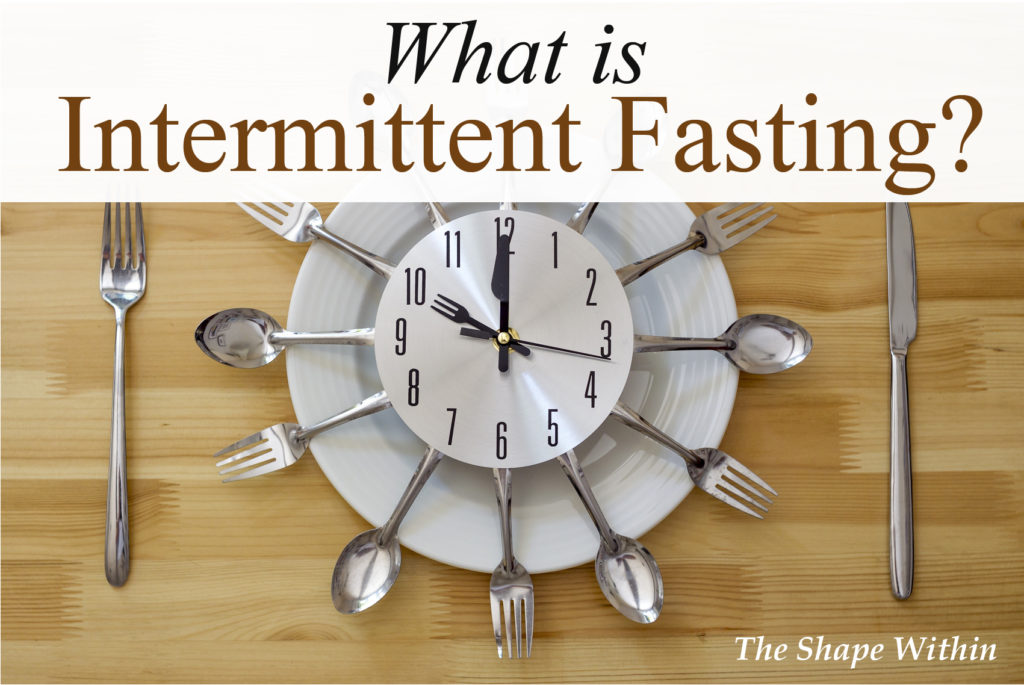
There are so many “dieting” methods that promise great results, but many of them are not worth the excitement and take our focus away from living a healthy lifestyle.
It is rare that I have the opportunity to learn about such a powerful idea, one that actually intensifies the effects of eating clean rather than focusing on all of the wrong things and cutting essential nutrients like so many fad and crash diets do.
The core of your fitness plan should always be healthy eating and regular exercise, so don’t treat intermittent fasting like a diet… as something that you need to depend on to get in shape or that you will “fail” if you stop doing. Intermittent fasting can become a lifestyle change, or you can use it whenever you want a bigger result.
When I learned about intermittent fasting I was already losing weight with good nutrition and exercise, and knew that if it was as effective as people claimed then I should see a very noticeable result added to what I was already experiencing.
Although healthy eating is my number one focus for staying lean and healthy, intermittent fasting is a method that I use frequently to increase my results. When I was losing weight at a heavier weight, I noticed a big difference in how much fat I was losing each day when combined with my already existing healthy eating efforts.
Now that I am past major weight loss and in the stubborn belly fat phase, I find intermittent fasting to be just as useful and effective for burning fat.
The instructions to IF are simple, but understanding the concept can be difficult. The trouble with explaining it lies in the fact that intermittent fasting has lots of benefits and it is hard not to mention all of them at the same time.
I will do my best to break down the idea into pieces that are easier to understand.
What is Intermittent fasting?
Intermittent fasting means consuming all of your daily food within a short period of the day, and eating nothing in the remaining hours of the day/night.
It is most common to fast for 16 hours, and then eat in an 8-hour window.
Many women find that 12 hours is a better fasting window for them and the way that their hormones work.
For example on days that I fast, I stop eating at 10:00 pm, then I don’t eat anything until 2:00 pm the following day. Then, I eat a whole day’s worth of food from 2:00 pm to 10:00 pm.
Though intermittent fasting only changes when we eat and not what we eat, this does not mean that you should neglect good nutrition. The benefits of a healthy diet coupled with intermittent fasting will intensify one another and allow you to take full advantage of your fat burning and muscle building abilities.
Before we go into further detail let’s get one thing straight. Yes, intermittent fasting gives flexibility in what you can eat while still losing weight, and it is nice to take advantage of that fact sometimes, but I am not here to show you a way to eat unhealthy food all day and still reach your goals. I am here to show you a method that can be added to a healthy lifestyle to make things faster and easier.
After all, if you gave up healthy eating and then experienced some success with intermittent fasting, you would become dependent on it to stay in shape.
Fasting is much different than the starving methods that I so strongly warn against. You can expect to work past some feelings of hunger while getting used to it, but the key difference is that you are still consuming all of your daily nutrients and calories. One of the biggest mistakes you can make with intermittent fasting is not consuming a full day’s worth of calories within your 8-hour eating window.
After breaking your fast you may be surprised at how much you will actually need to eat to consume your normal daily calories in such a short amount of time. In addition to the hard results that intermittent fasting brings, many people simply enjoy the simplicity of not eating during the day, as well as the ability to eat lots of food when they break their fast.
How intermittent fasting works
Okay so you fast for 16 hours and eat for 8 hours… got it. But why?
What intermittent fasting does, is allows you to burn more fat and every day/week, as well as to build muscle in some cases. We often hear that you can’t gain muscle and burn fat at the same time, and this statement is technically true if you take “the same time,” very literally as if to mean, “at the exact same time.”
However if you are just beginning to change your habits and have lots of improvement to make with diet and exercise, you absolutely can burn fat and build muscle within the same day by taking complete advantage of the time when your body is burning, and when it is building.
Here is how intermittent fasting works.
Fasting period
From the time that we go to bed till the time we wake, most of us are accustomed to going through an 8-hour fast on most nights of our lives. It is during this time that our body should normally transition into burning mode, where the available energy that you consumed from the day before has been used and your body is beginning to use your own fat as a source of energy.
The thing is… even though 8 hours sounds like a long time to go without food, our bodies have actually only begun to transition into burning mode after that amount of time, and we have yet to experience the power of being in a completely fasted state.
So you wake up and prolong your first meal for up to 8 hours. Some people only wait 4 hours and nothing is wrong with this, you will still experience the benefits of IF. During this time you will burn lots of fat since you have little to no external energy available to burn, and your body will release an incredible amount of fat burning and muscle building hormones (more on this below).
It is very important to drink lots of water to extract all the available nutrients from your body, and burn fat faster. Many people also drink black coffee during their fast to curb their appetite. The important thing is that you aren’t consuming calories until it’s time to break your fast.
It’s not just about extending the period that you are burning fat, it’s about letting your body go completely into a fasted state so that you are actually burning fat at a higher rate than normal.
Breaking your fast
After 16 hours, it is time to break your fast. After burning all of that fat in your fasted state, now you get to build muscle on the very same day thanks to your methodical efforts.
Since the stored energy in your blood, muscles, and other tissues has been used during the fasting period, your body will convert less of the energy you now consume to stored fat and direct more into your muscles.
A workout will intensify the effects of intermittent fasting in many ways, more of which I will discuss below, but the most important thing is that a high intensity workout will work your muscles enough to break them down and allow you to actually take advantage of the build phase and gain muscle.
You may now start to see how it is possible to burn fat and build muscle with intermittent fasting. During your fasting period you burn lots of fat without using muscle for energy, and after breaking your fast you build muscle without gaining fat.
This is all due to so effectively separating the burn and build state that the body goes through on a daily basis, and taking complete advantage of our abilities during those times. This why intermittent fasting works for weight loss, and how it does so extremely well!
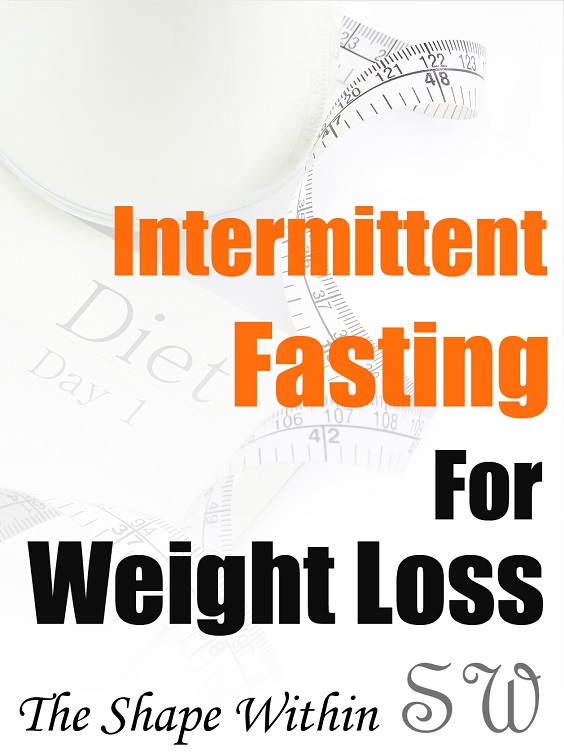
A deeper understanding: Why intermittent fasting works
I have explained the essential concept of intermittent fasting so far without mentioning some of the most important details. This is because when you first learn about IF and you are hearing about all of the amazing benefits all at once, it can be hard to connect everything.
Learning the details of intermittent fasting is great for anyone who wants to lose weight, even if they don’t plan to fast.
After I learned what intermittent fasting was, I finally understood how the body burns fat and gains muscle, which greatly affected my decisions afterwards whether I was fasting or not. For example, it was learning about insulin that finally made me give up drinking soda completely.
Let’s take a deeper look at how intermittent fasting works inside the body, and some of the additional benefits that I did not mention before.
I’ll discuss two key hormones that are responsible for fat loss and muscle gain, then I’ll explain what happens to the body throughout a single day of intermittent fasting.
This content was originally written on TheShapeWithin.com
What happens inside the body
In seeking to understand exactly how weight loss and muscle gain work, it is essential to discuss the chemicals/hormones in the body that are responsible for these processes. It is the releasing of these different types of hormones that determine whether we are in burn mode or build mode, which is all determined by how much sugar we have in our blood at a certain time of the day.
Don’t worry about trying to reason out exactly how these hormones interact, as scientists are still unraveling the complex way that they affect/trigger each other. The point is to understand that there is a very concrete reason that intermittent fasting works so well.
Insulin
Insulin is the most discussed hormone in the intermittent fasting world, as it is responsible for storing energy in fat and muscle cells. Our insulin levels also directly affect fat loss.
When we eat something it gets converted into glucose, then the body releases insulin to store the glucose and control our sugar levels. Insulin will store glucose in both muscle and fat cells, but intermittent fasting will allow more of the energy to be stored in muscle rather than fat.
So, insulin can store fat and help build muscle… but what does it have to do with burning fat?
Insulin does not actually burn the fat, but it very important in the process because fat cells can only be used for energy in the absence of insulin. When insulin is low, hormones that burn fat are released, and fat can start to be used for energy.
What I just mentioned above completely opened my eyes to the nature of weight loss, and made me give up soda completely. It finally occurred to me that not only were sugary drinks adding to the calories I was consuming, but sugar was causing an unnecessary insulin spike which was preventing my body from releasing fat.
So when insulin is extremely low, we are able to burn lots of fat, as well as release other helpful hormones at a significant rate.
Though insulin is something that naturally rises and falls throughout the day, we generally want to have less of it. With prolonged practice of intermittent fasting our body actually becomes more sensitive to insulin, which means that we do not need to release as much of it to store glucose. By extension this means that our body will store less glucose in fat, as you will not have excess levels of insulin.
Both intermittent fasting and transitioning to a healthy diet will build insulin sensitivity, though they work in much different ways. Both train your body over time to use insulin more efficiently and sparingly.
To put things into perspective, being sensitive to insulin is the exact opposite condition of diabetes (Type 2), where the body becomes resistant to insulin, releases excess levels of it to deal with sugar, and as a consequence experiences less and less time where insulin is low and when fat is being burned/ not stored.
Human Growth Hormone
So we talked about insulin, and how less of it is key in burning fat at a high rate, and also in storing glucose more efficiently. But what about the hormones that increase with intermittent fasting, the ones that we want more of!
The most critical chemical to discuss when talking about building muscle is HGH, or “Human Growth Hormone”. HGH is responsible for cell growth and reproduction, which means that it is key in muscle growth.
Human Growth Hormone is released when blood sugar is low, and so of course that means that we will get it during our fasted state. The exciting thing is that prolonging your fasted state from the normal 8 hours at night to 16 hours, doesn’t just make a little bit of difference in the amount of HGH released, but it actually can cause the body to release over 10 times your normal daily amount while intermittent fasting.
This may sound like too big of a number, but this is just the natural way that the body has been reacting to the fed and fasted state for thousands of years. It is only “recently,” that the comfort of civilization allowed humans to consume food all day long and unknowingly disrupt the benefits of fully switching between burning and building state.
This elevated level of human growth hormone plays a key role in the ability to gain muscle while intermittent fasting, even though you are also burning fat in the same day.
The list of intermittent fasting benefits goes on
Let’s not dig any deeper into these hormones, and quickly summarize what we have learned. If you research further you may come across additional hormones that are affected by intermittent fasting such as adrenaline, leptin, glucagon… and though it’s all important, the point is to understand that intermittent fasting has a very real and natural mechanism behind it that causes IF to work so well.
If you had wanted, you could have read only the top part of this article and known exactly how to start intermittent fasting, but the subject goes very deep because we need to know that something isn’t bullshit before we try it.
So after all that we have learned, let’s take a step back and quickly summarize what happens to the body throughout a day of IF.
A Detailed Day Of Intermittent Fasting
You wake up, and instead of eating you decide to wait until between 12:00 and 2:00 to start eating. The energy from the day before has almost all been used, and you’re starting to use your own store of fat for energy.
Your insulin levels are very low, your fat burning hormones are high, and you’re starting to burn fat at a high rate.
You drink some water to make you feel full, extract any remaining energy from the day before, and burn fat more efficiently.
As the day goes on you burn fat even more rapidly, and your body begins to release lots of human growth hormone.
When you eat something and finally break your fasted state, your body will sense sugar in your blood and release insulin to store it. Having completely depleted the stored energy in your blood and tissues during your fasted state, more of the glucose will now be directed back into your muscles instead of fat, especially if you incorporate a workout at some time in the day (don’t worry about whether you should work our before or after eating, both are great!)
The human growth hormone that was released during your fast period will stimulate better muscle growth during your build phase as well.
You eat, perhaps more than you thought it would take to consume around 2000 calories in 8 hours… and so you are definitely not hungry.
You wake up and the scale reads a little less, and you look a little thinner in the mirror, and you decide for yourself if it’s something that you want to repeat.
For me intermittent fasting was something that I absolutely want to keep doing. I do it more often as I see the results for myself and continue to read about amazing benefits that go beyond weight loss and muscle gain. Some people do it every day and maybe one day I’ll have that kind of dedication, but eating a lean and nutritious diet is something that I can rely on whether I am fasting on that day or not.
Want to completely improve your eating habits and transform the way you look and feel about yourself? Try the 8-Week Weight Loss Challenge! The challenge will help you start eating healthy one step at a time, and losing weight at a pace that you can stick with for the long run. Sign up below for your free PDF download or read more about the course here!
Want to learn all about how to change your diet for the long-term and lose 100 pounds? Check out the Ultimate Guide to Losing 100+ Pounds.
